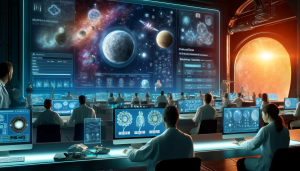 UseCasesFor.ai
UseCasesFor.ai
Choose Topic
 UseCasesFor.ai
UseCasesFor.ai
AI Use Cases
A collection of over 250 uses for artificial intelligence
A continually updated list exploring how different types of AI are used across various industries and AI disciplines,including generative AI use cases, banking AI use cases, AI use cases in healthcare, AI use cases in government, AI use cases in insurance, and more

Sign up
to receive a PDF containing all the use cases and stay updated with the latest AI trends and news (you can always unsubscribe)
Exoplanet detection and classification

Introduction
The search for exoplanets or planets that are located outside our solar system is one of the most fascinating and stimulating research topics in astronomy nowadays. The finding of these other worlds has the potential of offering explanations to questions such as the possibility of life elsewhere, varieties of planetary systems, and formation of planets. There are two types of Artificial Intelligence (AI) which are commonly used in this venture and they are; Generative AI (Gen AI) and Computer Vision AI (CV AI). These AI technologies assist in the automation of the detection as well as classification of exoplanets whereby the accuracy and time taken to process data is enhanced and thus allowing astronomers to concentrate on the analysis of the data and not get bogged down by the process of data sorting.
Challenges
There are numerous issues in the field of exoplanet detection and classification. First, there is a vast amount of astronomical data that can be collected in a given period and such data can be beyond the processing capabilities of conventional analysis tools. Second, the signals from exoplanets are usually faint and can be masked by other interferences hence making them difficult to pick. Third, false positives are an issue in exoplanet detection because other astronomical events can produce signals that are similar to those from exoplanets. Finally, the classification of exoplanets is challenging because of the many attributes that they may have including size, temperature and atmospheric composition.
AI Solutions
There are various challenges that limit our ability to discover exoplanets, and Gen AI and CV AI provide excellent solutions to these challenges. General AI, which encompasses neural networks and machine learning, can be taught to pick out the signs that are present in the data that indicates a planet. Of the data, Gen AI is capable of processing large amounts of data at fast speeds and can thus pin-point potential exoplanets that require further study. CV AI is especially effective in the classification of exoplanets as well since it works with images from telescopes. This is because CV AI can analyse images and identify characteristics of an exoplanet such as its size, which is determined by the apparent brightness of the exoplanet. For instance, the AI can deduce the size of an exoplanet using its temperature or the color of its host star. Some examples of such projects include NASA’s Kepler and TESS space missions which have-acc to AI- discovered thousands of exoplanets.
Benefits
There is a number of advantages of the Gen AI and CV AI as for the use in exoplanet detection and classification. First, it enhances the efficiency of data analysis thus enabling astronomers to analyze more data within a given period. Second, it enhances the accuracy of detection and classification thus reducing the chances of identifying false exoplanets and increasing the chances of identifying real ones. Third, it enables the processing of the complex data and identification of the features and trends that could be difficult for classical approaches. Finally, it leaves astronomers with more time to work on the analysis of the results and the strategy of the next observations, instead of being stuck with data.
Return on Investment
It is possible to realize a return on investment (ROI) when implementing Gen AI and CV AI in exoplanet detection and classification. Although, an expensive investment is required to set up and train the AI models in the initial stage, the enhancement in speed and efficiency along with higher level of accuracy can reduce the costs in the future. Furthermore, the new findings of exoplanets may result in new findings and potential application like mining of asteroids for minerals or even colonisation of other planets. From the perspective of societal impact, the discovery of extraterrestrial life can revolutionalise our knowledge and perception about the universe and life forms, which is an intangible return on investment.